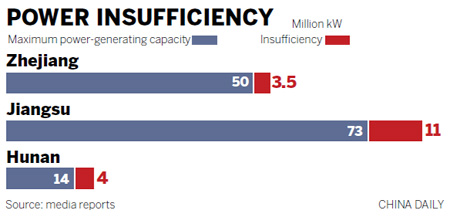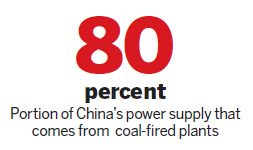Economy
Production battles against the dark ages
Updated: 2011-05-10 07:49
By Wang Zhenghua and Wu Yiyao (China Daily)
 |
Homes spared so far
It remains unclear whether residents' demand for electricity will be suppressed during the summer, though residents' power use has largely not yet been affected.
"Although government circulars have required power suppliers to secure power supply to residential users, it is possible that in some areas, especially North, Central and East China, residents will have to face power rationing during the peak season and they will have to turn off high-energy-consuming appliances like air conditioners for some hours during a day," a power supply specialist with the State Grid said on condition of anonymity.
People living in areas hardest hit by the power crunch have started preparing for rationing this summer.
"I bought a large fridge, with which I can make some ice blocks at home when it is powered on. These ice blocks can be used as a replacement for the air conditioner when our community is cut off from power," said Xu Qiang, 37, a resident of Hunan, where the daytime summer temperature could surge over 38 C.
The gap between supply and demand can become even wider, as power sources under construction are not enough to meet the increasing demand expected in the next two or three years, authorities warned. Thermal power plants running on coal will be discouraged by rising production costs and will be particularly insufficient, causing a drop of power production in the next few years.
Reliance on coal
The rising cost of coal, the largest source of power generation in China, has discouraged many power plants to increase their capacity to produce thermal power this year, while plants ran short of ways to raise the price of electricity, which is administered tightly by governments.
 |
But official figures show that the nation's new power generation capacity shrank by 2.68 million kW year-on-year in the first quarter. In Zhejiang, for example, no new thermal power generation units have been put into operation so far this year, while Zhejiang's capacity increased only 830,000 kW last year, a fraction of its current shortage of around 3.5 million kW.
The unwillingness of power plants to increase capacity pointed to the jump of coal prices. The average price of domestically produced coal reached 773 yuan a ton by the end of March from around 700 yuan in previous months. The price at major production sites, such as Shanxi and Inner Mongolia, has risen by double digits since earlier this year.
Fuel imports, on the other hand, declined in the first quarter year-on-year, according to the National Energy Administration. For instance, the floods in Australia early this year pushed up the price of Australian coal on international markets. In the first quarter of 2011, China imported 32.37 million tons of coal, a 26.4 percent year-on-year decrease.
Under the circumstances, the stock of coal at major power plants shrank quickly - to 53.1 million tons in April, sufficient for only 14 days, lower than the nation's warning level of 15 days.
Some captive power plants, those operated by big companies for their own use, simply suspended their production, increasing the pressure on public grid.
"For many power plants, the more electricity they produce, the more severe financial losses they will face," said Xue Jing, director of the Electricity Council's statistics department. "Power plants in China have been suffering from a short supply of coal for several years, and it reached a peak in 2011."
In the meantime, the low water levels for hydropower generation worsened the power crunch in the country.
Specials

2011 Sino-US Dialogue
China and the United States will hold the third round of the Strategic and Economic Dialogue from May 9-10 in Washington.

Bin Laden dead
The world's most wanted man was killed in a US raid in Pakistan.

US-style sports camp
The US sports camp company, Camp Woodward, will open its first residential camp in Beijing in June.